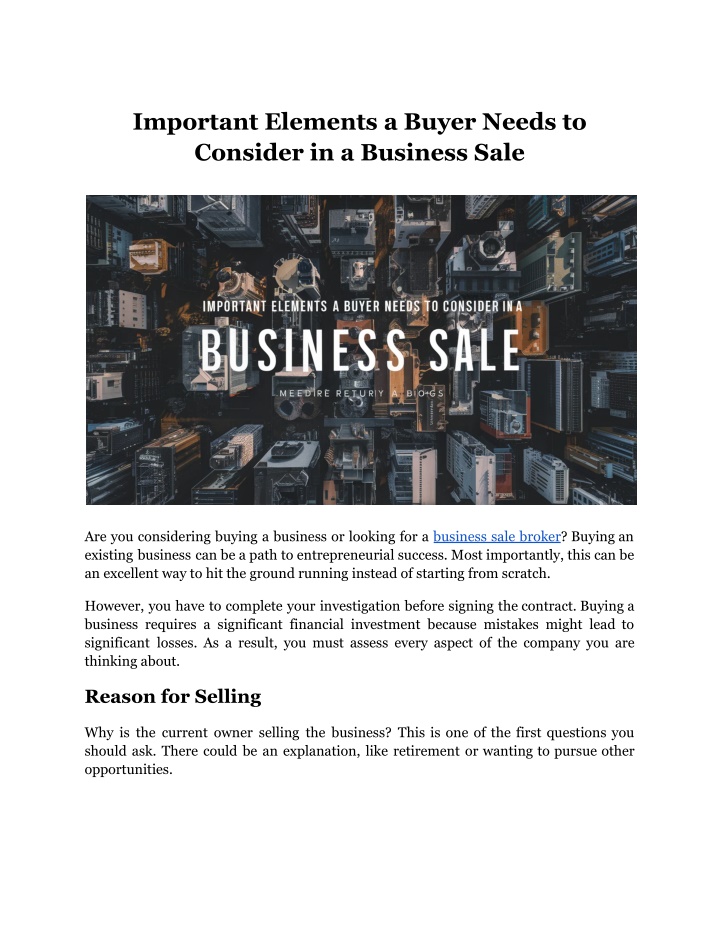
Important Elements a Buyer Needs to Consider in a Business Sale
Are you considering buying a business or looking for a business sale broker? Buying annexisting business can be a path to entrepreneurial success. Most importantly, this can benan excellent way to hit the ground running instead of starting from scratch.
Download Presentation

Please find below an Image/Link to download the presentation.
The content on the website is provided AS IS for your information and personal use only. It may not be sold, licensed, or shared on other websites without obtaining consent from the author. If you encounter any issues during the download, it is possible that the publisher has removed the file from their server.
You are allowed to download the files provided on this website for personal or commercial use, subject to the condition that they are used lawfully. All files are the property of their respective owners.
The content on the website is provided AS IS for your information and personal use only. It may not be sold, licensed, or shared on other websites without obtaining consent from the author.
E N D
Presentation Transcript
Important Elements a Buyer Needs to Consider in a Business Sale Are you considering buying a business or looking for a business sale broker? Buying an existing business can be a path to entrepreneurial success. Most importantly, this can be an excellent way to hit the ground running instead of starting from scratch. However, you have to complete your investigation before signing the contract. Buying a business requires a significant financial investment because mistakes might lead to significant losses. As a result, you must assess every aspect of the company you are thinking about. Reason for Selling Why is the current owner selling the business? This is one of the first questions you should ask. There could be an explanation, like retirement or wanting to pursue other opportunities.
However, there's also a possibility that the owner is getting out because the business is struggling or has fundamental issues. Therefore, you need to go into detail to know the real motivation behind the sale. Financial Performance The profitability of the company is among the most crucial variables. See the last three to five years' worth of tax returns and complete financial statements. Seek out: Revenue Expenses Profit/loss Cash flow Assets Liabilities Be aware if the owner is reluctant to provide this documentation. That could indicate they have something to hide about the business's true financial condition. If the numbers check out, that's a positive sign. But you'll still want to scrutinize them closely with an accountant and look for any irregularities or concerning trends. Revenues should show steady growth year-over-year. Expenses and debt levels need to be reasonable and manageable. Customer Base As the new owner, you'll want to inherit a strong, stable customer base. Ask for a breakdown of the current customers by revenue, industry, and how long they've been customers because just a few big customers could spell trouble if you lose one. Competitive Landscape It's best to thoroughly assess the competitive environment the business operates. How many other local businesses provide comparable services? What benefits or drawbacks does this company have in comparison to its rivals? You'll need to evaluate potential threats as well. If the business has a well-defined niche with high barriers to entry for competitors, that's a plus. But if they're getting squeezed in an overly crowded market with lots of competition, you may want to reconsider.
Brand Reputation For many businesses, brand identity and goodwill built up over the years is extremely valuable. Does the business you're considering have a strong reputation and image in the industry or community? What about online reviews and word-of-mouth? A tarnished brand that customers avoid can be very difficult to rehabilitate. However, a highly-regarded business with a solid reputation is a major asset that can give you a head start. Location and Facilities If the business operates out of a physical location like a retail store, restaurant, factory, etc., scrutinize the location. Is it easily accessible with good visibility and foot traffic? Or is it tucked away in an undesirable area that's hard to find? You'll also want to tour and inspect any facilities, such as: Office Warehouse Manufacturing plant Do they require expensive upgrades or are they well-maintained and modern? Don't forget to examine the lease terms and consider options if you eventually outgrow the existing space. Intellectual Property Important intellectual property (IP) assets, including databases, patents, copyrights, trademarks, and proprietary technology, are possessed by some organizations. Therefore, consult with an attorney to conduct IP due diligence and audits as needed. The last thing you want is to buy a business only to get sued later for IP infringement because you didn't secure proper ownership. For online/tech companies especially, IP is often the most valuable asset of all. Solidify your ownership claim over any IP before finalizing the sale. Read More Articles: What are Simple Ways to Ensure the Credibility of Online Quran Classes?
Company Culture Look at metrics like employee tenure and turnover rates. Meet with key managers and personnel to gauge their experience, skills, and attitudes. You may decide to retain some staff but phase others out over time. The company culture and working environment are also important factors. Do employees appear motivated and engaged, or do they seem burned out? A toxic work culture can crush morale and productivity. However, a positive culture where people enjoy coming to work is invaluable. It will help with retaining talent and attracting new top performers after your ownership. Growth Potential While the current state of the business matters, you'll also want to look ahead and evaluate the growth potential and question yourself, for instance: Is the business stagnant in a mature market with limited upside? Does it operate in an emerging, fast-growing industry? As the new owner, what is your strategic vision for taking the company to the next level? Can you identify clear opportunities to scale through new product/service offerings? In all of these, the best scenario is buying a business with a proven track record that also has significant room to grow under new leadership and execution. Most importantly, avoid companies that appear flat-lined with no obvious pathways for future growth. Owner Responsibilities and Involvement In some business sales, the current owner may want to remain involved in an ongoing role like consulting or advisor. This could help to ensure a smooth ownership transition. It may get challenging, though, if the previous owner is determined to interfere or challenge your authority as the new employer. If the former owner intends to stay, you will need to set clear expectations and limits right away. Alternatively, the previous owner may be completely checked out with no interest in assisting the new buyer. In that case, you'll have to determine if overhauling the business and replacing key leadership is a necessity or a potential dealbreaker.
Analyze Your Skill Be honest with yourself about whether you're truly ready and capable of running this particular business. Does it align with your background, strengths, management philosophy, and interests? Operating it at a high level may require the knowledge and expertise you currently lack. Conclusion Each step you take gets you closer to making your dreams come true. So, keep going, stay determined, and get ready for all the amazing things waiting for you! Let Sell My Business help you out! We're experts in selling businesses. Trust the experts at brokers to sell your business to get the job done. Site Article: Important Elements a Buyer Needs to Consider in a Business Sale





















